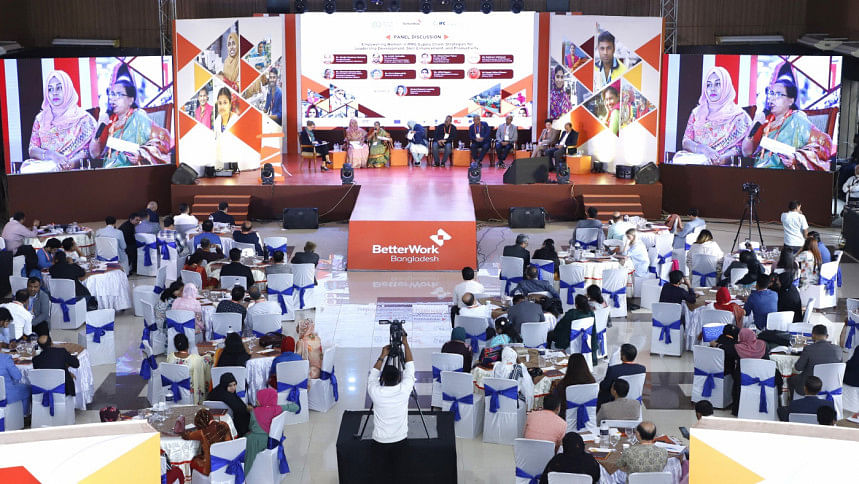Collaboration key for inclusive, sustainable garments sector

The garments industry of Bangladesh still suffers from a huge wage gap between male and female workers, with the latter holding just 5 percent of all supervisory positions in the sector, according to experts.
So, collaborative and sustained efforts aimed at promoting gender equality and advancing women's leadership are required for a more inclusive and sustainable garments industry, they said.
Speaking at a discussion, styled "Gender Equality and Returns: Advancing Women Leadership, Skills Development and Productivity in the Supply Chain", they expressed concern over several challenges hindering women's advancement in the garments sector.
These include adverse and unfriendly work environments, wage gaps, huge workloads, low wages, and lack of accommodation and transport facilities.
Besides, women's capabilities are often underestimated or undermined, driving them out of the workforce, the speakers said.
They also underscored the need for collaborative efforts from the government, factory owners, buyers, and all other stakeholders to create a more equitable garments industry, one free of barriers and challenges for women.
The event was organised by the International Labour Organisation (ILO) and International Finance Corporation (IFC) in collaboration with Bangladesh Apparels Exchange.
Held at the Chittagong Boat Club in Chattogram, the event was aimed at showcasing the achievements of Gender Equality and Returns (GEAR), a joint initiative of the ILO and IFC.
GEAR was launched in 2016 to promote gender equality and economic enhancements in the country's garments sector.
While providing an overview of the initiative, ILO Programme Coordinator Shamsul Hoque said GEAR has trained 800 female workers of 101 factories since its inception.
Quoting an impact assessment on GEAR by Oxford University, Hoque said the initiative led to a 5 percent boost in terms of line efficiency and 39 percent wage hike for female workers in supervisory positions.
It also contributed to improving quality control and enhancing the confidence and capabilities of trained workers, he added.
ILO Country Director Tuomo Poutiainen said the GEAR programme is advancing the capacity of young women to better their livelihoods and generate new opportunities for themselves and their families.
The ILO looks forward to continuing this work through the expansion of GEAR to foster a more inclusive workforce and drive tangible improvements in productivity and competitiveness, he added.
In a video message, HE Park Young Sik, South Korea's ambassador to Bangladesh, commended the progress of the initiative.
"Korea is proud to support Bangladesh in these vital initiatives. The strides made here in gender equality inspire many," he said.
Leena Khan, labour attaché of the US embassy in Dhaka, said graduates of the GEAR programme contribute to better working conditions, ensure that worker voices are heard, and facilitate better employment opportunities for women.
"We recognise the programme's important work to improve worker rights in the garment industry and make the sector more competitive," Khan added.

 For all latest news, follow The Daily Star's Google News channel.
For all latest news, follow The Daily Star's Google News channel. 



Comments